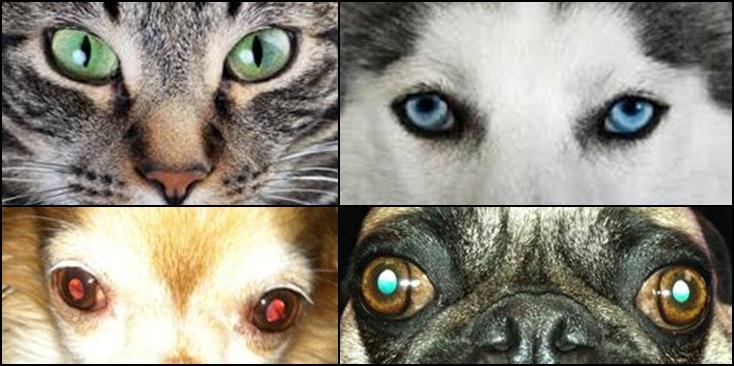
The job of the Veterinary Ophthalmologist is to preserve vision and comfort for animals. Our goal is to meet the need for an advanced eye exam and advanced eye care, often at the request of the primary veterinarian.
Animals may be affected by the same types of eye diseases that affect humans including eyelid defects, dry eye, corneal ulceration, cataracts, glaucoma, and retinal disease. Many systemic problems, or problems within the body, are initially identified through an eye exam. For example, small retinal changes may be the first indication that an animal has high blood pressure. Additionally, inflammation within the eyes can be the only initial sign of some infectious diseases and certain types of cancer.
Many eye problems that our pets experience are due to breed-related or genetic abnormalities. For example, brachycephalic or short-headed breeds – both dogs and cats – are predisposed to many eyelid, corneal, and tear problems simply due to their conformation. These abnormalities can lead to chronic discomfort as well as vision loss. Inherited cataracts are the most common type of cataracts seen in dogs and can lead to blindness. Cataract surgery in dogs is performed using the same technology and nearly the same surgical technique as in humans. Veterinary Ophthalmologists can not only diagnose and treat these inherited problems, but we can work with breeders to help eliminate such problems from the gene pool.
A thorough eye exam is non-invasive and can be completed quickly with minimal restraint in the vast majority of animals. We use the same basic instruments as our physician counterparts to examine the area surrounding the eye, the eyelids and the eye itself. A comprehensive, basic eye exam includes measurement of tear production, staining the eye for corneal abrasions/ulcers, and measurement of pressure within the eye.
In the upcoming months, we will discuss how to evaluate your pet’s vision and overall ocular health, common eye diseases in dogs and cats, and how to prevent some common eye problems. If there are any specific topics that you would like to see discussed, please contact us and we will be happy to try and include your suggestions.
MVA 5K
Every year Metropolitan Veterinary Associates organizes a 5K run/walk (leashed participants are encouraged to join) with all proceeds benefiting local non-profit animal rescue organizations. To learn more about the MVA5K click here.
Save A Life
There are very few national animal blood banks. Your dog may be able to save a life by donating blood. Learn more about it today by clicking here.
Ask A Question
It’s important that our patients and their families can get to know our doctors and the facility. Ask us a question about anything for a chance to see it answered on our blog.